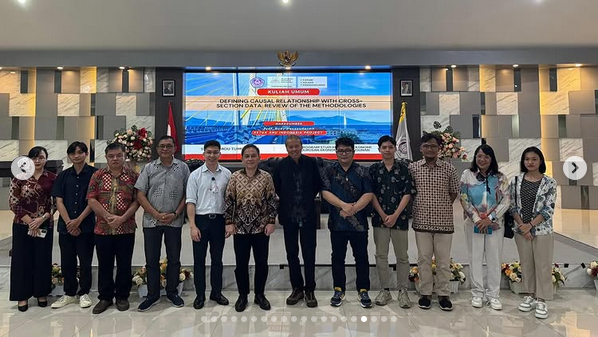FKP on Wednesday, 20 November 2024 hosted by the Faculty of Economics and Business, Universitas Sam Ratulangi (FEB UNSTRAT) in Manado (North Sulawesi) with speakers Budy P. Resosudarmo (The Australian National University), Victor Lengkon (Dean, FEB UNSRAT), Een Walewangko (FEB UNSRAT), Joy Tulung (FEB UNSRAT), Rizki Nurfifah (FEB UNSRAT).
This public lecture explains one of the key methodologies for analyzing problems using cross-sectional data. This method is particularly useful for identifying the causes of certain events or phenomena, thereby addressing uncertainty and optimizing success through various policy simulations. The main presentation was given by Professor Budy P. Resosudarmo (The Australian National University) who focused on establishing causal relationships using cross-sectional data, with a detailed methodological review. Around 200 students and faculty members attended the seminar. Unfortunately, the seminar was not recorded.
In his presentation Professor Resosudarmo highlighted the importance of causality in policymaking, especially for evaluating the direct impact of public policy interventions on outcomes like income and health. In the context of achieving the Indonesia Emas 2045 goals, a careful design of interventions need to be undertaken to ensure desired outcomes will be achieved.
The presentation discussed econometric methods, such as instrumental variables, regression discontinuity, and natural experiments, emphasizing their relevance and limitations in cross-sectional settings. Challenges like endogeneity, measurement errors, and omitted variables were addressed, alongside strategies to mitigate these issues.
The second part examines specific studies, including the 2004 Indian Ocean tsunami’s long-term impacts on children in Banda Aceh. Using spatial regression discontinuity, the analysis reveals significant adverse effects on education, health, and cognitive outcomes. Parts of this research was presented at an FKP seminar in August 2021; recording and slides are available from this link.
Another case explored caste-based disparities in Sumba Island, emphasizing democratization’s potential to reduce inequalities. The findings advocate for tailored policies to address social and disaster-induced inequalities, demonstrating cross-sectional data’s role in advancing impactful research and policy design. This research was presented in July last year, and recordings can be reviewed from this link.





